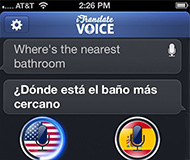5/12/2016
Federal Appeals Court Upholds Iphone Translation For Search ConsentSeventh Circuit US Court of Appeals rules an iPhone translation app is good enough to ask for consent to search a vehicle.

A police officer can use the iPhone's iTranslate app to obtain a motorist's consent for an automobile search under a ruling handed down last month by the Seventh Circuit US Court of Appeals. A unanimous three-judge panel decided that the app's translation was close enough to accurate to uphold the legitimacy of the traffic stop and search that ended up in the conviction of Pavel Leiva for credit card fraud.
Leiva is a Florida resident from Cuba who only speaks Spanish. On June 26, 2013, he was driving with two accomplices on Interstate 55 in Springfield, Illinois when state Trooper Dustin Weiss saw the rented white Hyundai Elantra and became suspicious of Leiva's quirky behavior behind the wheel. The trooper decided to follow and allegedly saw Leiva swerve. He conducted a traffic stop.
Immediately, Trooper Weiss had trouble communicating with Leiva. The trooper had a sheet of prepared questions in Spanish in his patrol car. After going through them, he wrote Leiva a warning and then asked his iPhone to translate "You are free to go." He read the output to Leiva.
Before the driver could leave, Trooper Weiss added, "Un momento." Then the trooper used iTranslate to ask, "Puedo buscar su coche?"
"Yes," Leiva replied. "Si."
The search turned up 65 bogus credit cards along with a trunk full of fraudulently purchased goods. At trial, Leiva's attorney produced a set of linguistic experts who testified that the question Trooper Weiss asked was not about consent for a search, but "May I get your car?" or "May I locate your car?" The correct translation would have been "Puedo revisar su carro?"
Pointing out that the officer had no need to "locate" the car that was right in front of him, the appellate panel discounted the idea that Leiva was baffled by a mistranslation.
"The district court did not err in finding that Leiva had voluntarily consented to the search of the Elantra and denying Leiva's motion to suppress," Judge William J. Bauer wrote for the panel. "Even accepting that Weiss' Spanish question does not mean exactly what he intended, the district court was not clearly erroneous in finding that based on the totality of the circumstances Leiva voluntarily consented to the search."
The court upheld Leiva's sentence of 82 months in prison, plus a payment of $3797 in restitution. A copy of the ruling is available in a 100k PDF file at the source link below.


